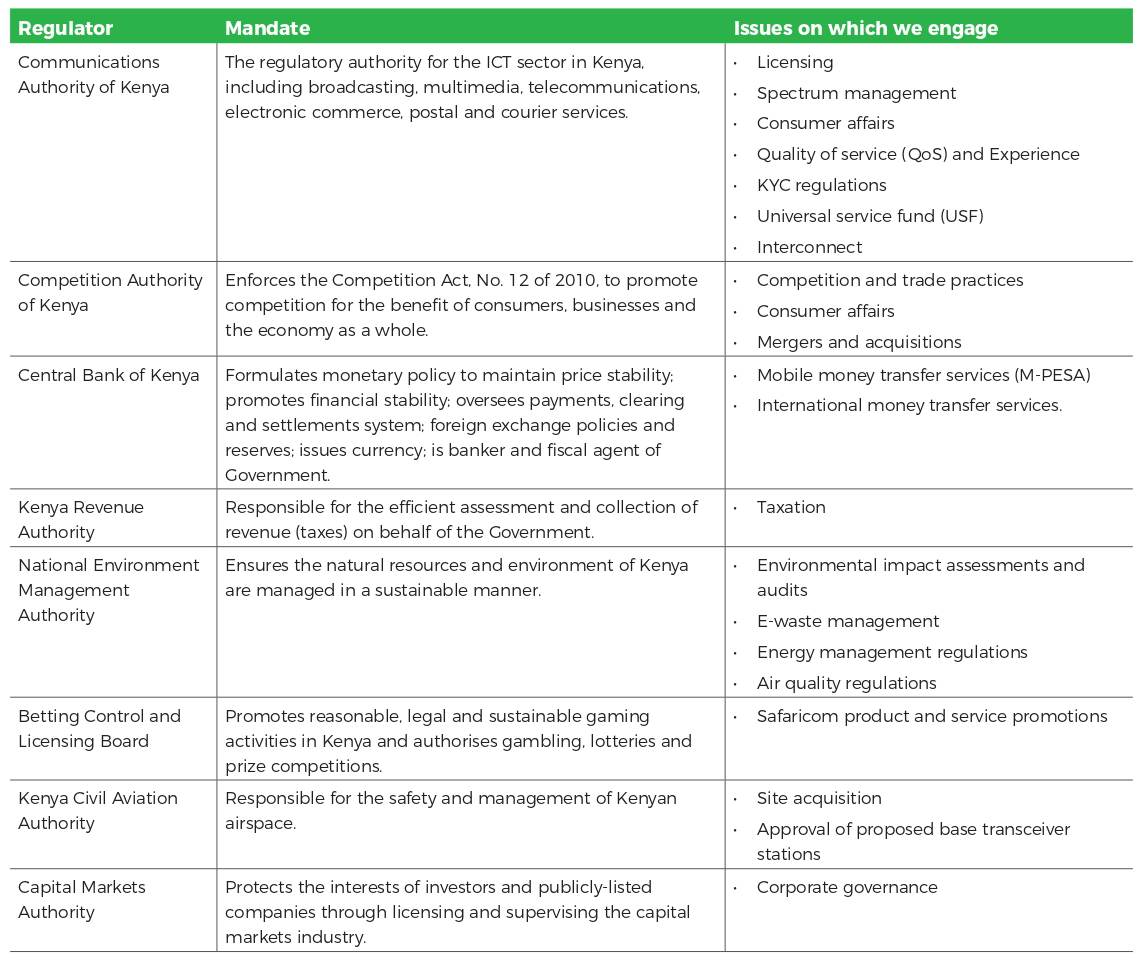OUR REGULATORS
NURTURING A SYMBIOTIC RELATIONSHIP WITH REGULATORS
![]() We continue to build and maintain cordial relationships with regulatory bodies and policy makers. Our engagements are regular, transparent and mutually beneficial, as we endeavour to uphold the highest standards of compliance to our license obligations and engage our regulators on challenges unique to the telecommunications industry.
We continue to build and maintain cordial relationships with regulatory bodies and policy makers. Our engagements are regular, transparent and mutually beneficial, as we endeavour to uphold the highest standards of compliance to our license obligations and engage our regulators on challenges unique to the telecommunications industry.
We continue to uphold the highest levels of compliance to our licence obligations while conducting our business in an ethical manner. We have developed our regulatory universe to help us improve compliance monitoring. Our principal regulator remains the Communications Authority of Kenya, and in total we engage with eight regulatory bodies:
Alongside ensuring that we retain company-wide compliance with our regulators, we are also working on tangible ways to strengthen our stakeholder engagements in a rapidly changing regulatory landscape. With consumers gaining more power, the need for robust data protection standards has come strongly into focus for the mobile industry. We seek to maintain its high standards of transparency to ensure that customer rights are placed at the centre of our product development and service delivery, even as new technologies such as Artificial Intelligence (“AI”) and Internet of Things (“IoT”) emerge.
In line with this, the Regulatory and Public Policy team expanded to include the International Carrier, Roaming and Co-location teams, in order to ensure regulatory compliance and assure customer satisfaction. In addition to the team’s pre-existing support role, it is now responsible for revenue generation arising from these new functions.
QUALITY OF SERVICE & CUSTOMER PROTECTION
Alongside rising public interest, regulators have also begun to place a high premium on quality of service and customer protection.
The Communications Authority’s new Quality of Service (QoS) standards were operationalised on 1st July, 2018 and are expected to be fully adopted over a period of three years. These will introduce new fi nes for non-compliance and a fresh scope of parameters to determine call quality and customer satisfaction levels.
At the same time, the issue of grey traffic continues to raise both billing and national security concerns. Grey traffic is currently on an upward trend in the Kenyan Market, mainly due to international traffic being disguised as local calls. The result is that unscrupulous service providers can take advantage of the difference in local and international termination rates, and there is no traceable evidence of the calls once they are terminated. The CA issued Determination No. 1 of 2018 which establishes a framework that will enable operators in Kenya to deal with illegal international traffic.
We continue to work in tandem with the Regulator to eliminate this practice.
“Grey traffic” refers to network traffic that is legal on one end of the network, but illegal on the other. International calls are disguised as local calls in order to take advantage of the difference in local and international termination rates. This is contrary to international best practice as well as International Telecommunication Union (ITU) standards requiring that genuine Caller Line Identity (CLI) (which enables operators to route international and local traffic accurately) be displayed.


